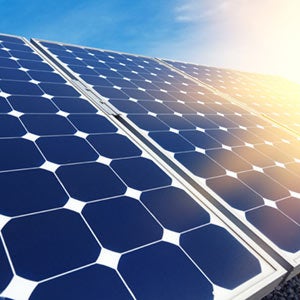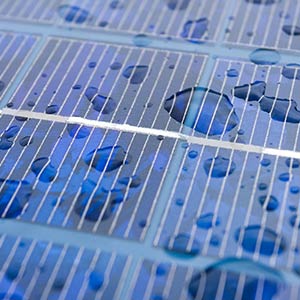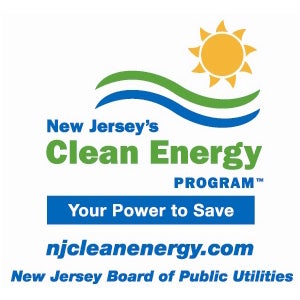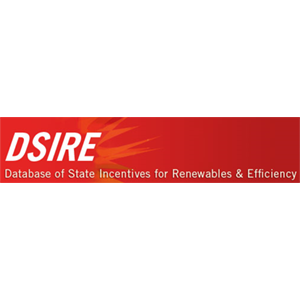
While solar is comprised of a diverse suite of technologies, there are three main types: photovoltaics (PV), solar heating & cooling (SHC), and concentrating solar power (CSP). Homeowners and businesses interested in going solar are primarily interested in the first two technologies, while utilities and large-scale energy project developers primarily utilize the latter.
PV panels directly produce electricity from sunlight, while SHC technologies use thermal (heat) energy to change the temperature of water and air. PV panels have no moving parts, and use an inverter to change the direct current (DC) power they produce to usable alternating current (AC) power. SHC technologies are often used to heat water for domestic or commercial use, but can also be used to heat or cool the air in buildings.
Most concentrating solar power systems use concentrated sunlight to drive a traditional steam turbine, creating electricity on a large scale.
Photovoltaic panels can use direct or indirect sunlight to generate power, though they are most effective in direct sunlight. Solar panels will still work even when the light is reflected or partially blocked by clouds. Rain actually helps to keep your panels operating efficiently by washing away any dust or dirt. If you live in an area with a strong net metering policy, energy generated by your panels during sunny hours will offset energy that you use at night and other times when your system isn't operating at full capacity.


SolarReviews publishes the most comprehensive data available on the cost of installing solar panels. We have installed solar power system cost data for more than 100,000 residential installations searchable by location, size of system, date of installation, solar panel used and inverter used. This is data from real installations over the last 18 months and shows the price of each system.
SolarReviews also published solar panels cost data from estimates given on www.solar-estimate.org. This site houses the leading solar calculator in America and is used by approximately 80,000 consumers per year to get comparative estimates on solar panels from solar installers. While we do not publish the individual estimates given by installers through this site we have access to this data to publish average solar panels cost data for each city in America and also average solar cost for each system size from 3kW to 20 KW.
Every rooftop is different, and solar installers in your area can provide the best information on what it will cost to go solar for your home or business. Once potential solar customers begin exploring their options, they often find that the total up-front cost of solar is less relevant than the financing terms, return-on-investment, and cash flow calculation. Solar leases and other innovative financing models mean that many people can go solar for little or no money down. Some solar customers save more on their electricity payments than they're paying for their panels, meaning that their investment is cash-flow positive from day one. Learn more about the cost of solar photovoltaics (PV), solar heating & cooling (SHC) systems, and the growth of the solar market in the U.S.
Several factors influence the cost of solar for your home or business, including:
Considered broadly, everything from investments in solar research & development to streamlining local permitting can reduce the cost of solar energy to the end-user. Browse our Issues & Policies section to learn more and get involved!
In a lease, a customer pays for the solar power system over a period of years, rather than in an up-front payment. Often customers can purchase solar for little or no money down, and often realize energy savings immediately. In a power-purchase agreement, a customer agrees to purchase all the energy from a solar system over a fixed period of time. Read more about solar leases and PPAs on our third-party financing page.


Solar renewable energy credits or SRECs show that a certain amount of electricity was produced using solar energy. They are typically used in conjunction with state-level renewable energy standards (also called renewable portfolio standards) to show that regulated entities are meeting their solar energy goals. In one innovative model, PSE&G, a utility in New Jersey, used their state's SREC program to provide loans to homeowners for their solar systems. The loans were then repaid using the SRECs generated by the customers' solar energy systems.
There is a 30-percent federal investment tax credit (ITC) for solar energy systems in place until December 31st, 2016. Both residential and commercial customers can take advantage of this tax credit, and it applies to all three major types of solar technology; photovoltaic,solar heating & cooling, and concentrating solar technology.
In addition to the federal ITC, many states, counties, municipalities and utilities offer rebates or other incentives for solar energy technologies. Your installer will be able to provide the most up-to-date information on solar incentives. The Database of State Incentives for Renewable & Efficiency (DSIRE) has a comprehensive list of solar incentives by state, as well as more information and maps showing solar policies across the U.S.
Going Solar FAQ's courtesy of the Solar Energy Industries Association

The information on our website is general in nature and is not intended as a substitute for competent legal, financial or electrical engineering advice. Reviews on this site do not reflect the views or opinions of SolarReviews or its directors or shareholders, nor an endorsement of any third party company. We make no representation as to the accuracy of the information entered by third parties. We disclaim any liability for any damages or loss arising from your use thereof.
Sitemap Privacy Policy Do not sell my details Terms of Use For Installers Register Login
Copyright © 2012 - - solarreviews.com. All rights reserved.